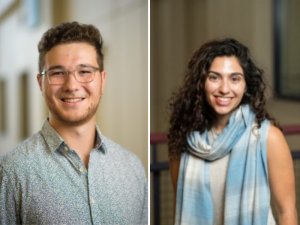Presented By: Department of Psychology
Social Brown Bag:
Wilson Merrell and Nadia Vossoughi, Social Psychology Graduate Students

Wilson Merrell:
Title: Exploring Fundamental Social Motives in Older Adults
Abstract: The United States population is aging at a rapid pace, with the number of Americans 65 and older projected to more than double over the next 40 years. This demographic shift highlights the increasing importance of fully explaining the mechanisms that drive changes in outcomes relevant to older adults. Merging evolutionary perspectives on fundamental social motivations with current aging research, we propose a framework for understanding cognitive and behavioral outcomes in older adults from an ultimate, threat-based perspective. Using publically available secondary IAT data from Project Implicit (N = 552,288), we present a disease-specific test case for our framework. Preliminary results reveal flexible, specific responses to different disease-relevant targets across the lifespan that may be tied to age-dependent threats.
Nadia Vossoughi:
Title: Witnessing microaggressions in an engineering context harms learning and participation.
Abstract: Experiencing microaggressions—defined as subtle verbal, behavioral, or environmental slights directed towards someone due to their social category (Sue, 2010)—impedes academic success among marginalized students in science and engineering (e.g., Moss-Racusin et al., 2018; Adams et al., 2006). Most research examining the consequences of microaggressions has focused on directly experiencing microaggressions, but we propose that just witnessing microaggressions may create a negative environment that also impedes academic success. Using an experimental design, we showed undergraduate science and engineering students (n=208) video footage of a mixed gender group working on a design project that participants believed they would later join. From the video footage participants either witnessed subtle bias directed at a woman by a man (microaggression condition) or subtle bias did not occur in the interactions (control condition). We find that just witnessing microaggressions leads to lower memory retention of engineering material, and decreased desire to join their group (ps<.05). The negative effect of witnessing microaggressions was present for both men and women and remained significant after controlling for confidence in one’s engineering abilities and rejection sensitivity. Results indicate that the presence of microaggressions contributes to a negative environment that is detrimental to everyone’s academic learning and participation.
Title: Exploring Fundamental Social Motives in Older Adults
Abstract: The United States population is aging at a rapid pace, with the number of Americans 65 and older projected to more than double over the next 40 years. This demographic shift highlights the increasing importance of fully explaining the mechanisms that drive changes in outcomes relevant to older adults. Merging evolutionary perspectives on fundamental social motivations with current aging research, we propose a framework for understanding cognitive and behavioral outcomes in older adults from an ultimate, threat-based perspective. Using publically available secondary IAT data from Project Implicit (N = 552,288), we present a disease-specific test case for our framework. Preliminary results reveal flexible, specific responses to different disease-relevant targets across the lifespan that may be tied to age-dependent threats.
Nadia Vossoughi:
Title: Witnessing microaggressions in an engineering context harms learning and participation.
Abstract: Experiencing microaggressions—defined as subtle verbal, behavioral, or environmental slights directed towards someone due to their social category (Sue, 2010)—impedes academic success among marginalized students in science and engineering (e.g., Moss-Racusin et al., 2018; Adams et al., 2006). Most research examining the consequences of microaggressions has focused on directly experiencing microaggressions, but we propose that just witnessing microaggressions may create a negative environment that also impedes academic success. Using an experimental design, we showed undergraduate science and engineering students (n=208) video footage of a mixed gender group working on a design project that participants believed they would later join. From the video footage participants either witnessed subtle bias directed at a woman by a man (microaggression condition) or subtle bias did not occur in the interactions (control condition). We find that just witnessing microaggressions leads to lower memory retention of engineering material, and decreased desire to join their group (ps<.05). The negative effect of witnessing microaggressions was present for both men and women and remained significant after controlling for confidence in one’s engineering abilities and rejection sensitivity. Results indicate that the presence of microaggressions contributes to a negative environment that is detrimental to everyone’s academic learning and participation.